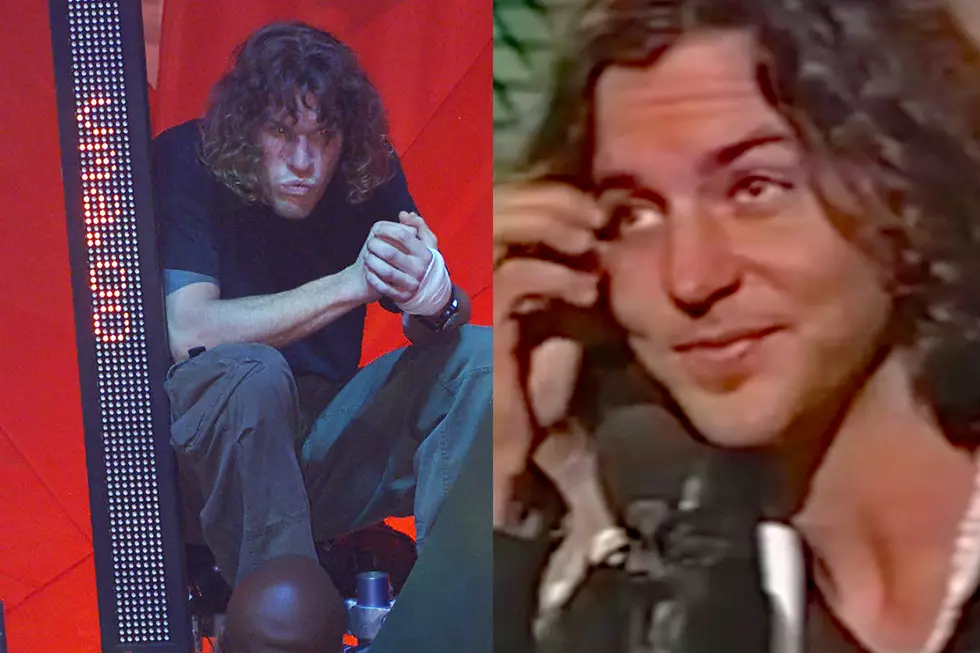31 Years Ago: Pearl Jam Release Their Debut Album ‘Ten’
Who knew? After toiling for several years in Seattle bands like Green River and Mother Love Bone, bassist Jeff Ament and guitarist Stone Gossard could have taken a step back from playing after the death of Mother Love Bone vocalist Andrew Wood in 1990, but instead the pair were invited by Soundgarden's Chris Cornell to pay homage to Wood in a project called Temple of the Dog. And also during this period, they gathered their bearings and decided to push on by forming a new band, one that would eventually become Pearl Jam.
Rounding out this new group were guitarist Mike McCready, drummer Dave Krusen and a singer named Eddie Vedder from San Diego who was given a Stone Gossard demo tape by former Red Hot Chili Peppers drummer Jack Irons and decided he liked what he heard and felt like writing some lyrics and singing over the track. Included on the demo tape was a song called "Dollar Short" that fans would eventually come to know as "Alive."
Vedder had the idea that three of the songs told a story like a mini rock opera that could be tied together. He told Rolling Stone, "[It's] based on things that had happened, and some I imagined."
Of those instrumentals, the first would become "Alive," a track penned by Vedder loosely based on the fact that he learned the man who was his stepfather wasn't his real father and that his biological father had passed on. "Everybody writes about it like it's a life-affirmation thing -- I'm really glad about that," said Vedder with a laugh. "It's a great interpretation. But 'Alive' is … it's torture, which is why it's f---ed up for me. Why I should probably learn how to sing another way. It would be easier. It's too much."
Pearl Jam, "Alive"
The other two songs in the mini-opera derived from Gossard's demos were "Once," a track detailing how the son couldn't deal with the betrayal and became a serial killer, and "Footsteps," a track about his eventual execution. "It's a modern way of dealing with a bad life," Vedder told Rolling Stone, before smiling and adding, "I'm just glad I became a songwriter."
Not long after Vedder wrote the songs and recorded over the demo, the tape made its way back to Gossard and Ament, who were blown away by what they heard. Vedder was invited to Seattle and by the time he arrived in town, he also had the song "Black" that would become a future Pearl Jam favorite, as well. Within a week, the fivesome of Vedder, Gossard, Ament, McCready and Krusen were fully clicking.
The songs were flowing and shortly after Vedder's arrival in Seattle, the band signed a record deal with Epic and entered London Bridge Studio to record their debut disc with producer Rick Parasher. Even before they hit the studio, a majority of the record was already written. Only "Porch," "Deep," "Why Go" and "Garden" were penned during their monthlong stay at London Bridge.
Reflecting on that period, McCready told Spin, "Ten was mostly Stone and Jeff. Me and Eddie were along for the ride at that time." But there was little doubt that Vedder's songwriting expertise helped bring the Gossard and Ament songs to life. "All I really believe in is this f---in' moment, like right now," Vedder stated of his songwriting approach. "And that, actually is what the whole album talks about."
Loudwire Original Series: '30 Years of Grunge' — Ep. 1: Who Invented Grunge?
Though the album was good to go, there was still one more obstacle to address before they went on to monster success. Drummer Dave Krusen entered rehab shortly after recording was complete, revealing that liquor had gotten the better of him. In an interview with Punk Globe, Krusen would reflect, "It was a great experience. I felt from the beginning of that band that it was something special … They had to let me go. I couldn't stop drinking, and it was causing problems. They gave me many chances, but I couldn't get it together."
With Krusen exiting, the band briefly filled the void with Matt Chamberlain, but he had other obligations and recommended Dave Abruzzese, who sat behind the kit for a majority of the Ten album touring.
On Aug. 27, 1991, Epic released the Ten album, making "Alive" the lead single. The track dropped a few weeks prior to the album release and enjoyed a slow climb. With a familiar almost siren-like guitar opening, listeners began to take notice. And while Vedder had stated that the song was somewhat torture to him, fans interpreted it a different way, taking it as an anthem for self-empowerment.
Vedder would later reveal on the band's VH1 Storytellers episode that thanks to the fans, he was later able to view the song differently. "They lifted the curse," said the singer. "The audience changed the meaning for me." As for THAT guitar solo, you know the one that typically gets fans going, Mike McCready revealed in Guitar School that he was inspired by Ace Frehley's work on "She" and The Doors' "Five to One" when coming up with the licks. As an intro to the band, "Alive" would climb to No. 16 on the Mainstream Rock Chart and No. 18 Modern Rock, but would become a classic despite its modest radio play.
Pearl Jam, "Even Flow"
By April 1992, Pearl Jam had started gaining traction and "Even Flow" showed it. The song would climb to No. 3 on the Mainstream Rock Tracks chart and the concert-based video showcased exactly how special the band was as a live act. Oddly enough, "Even Flow" caused the band the most trouble in the studio.
In Musician Magazine, Ament recalled, "I know it was a great song all along, and I felt that it was the best song that we got the worst take of on the first record. There were a hundred takes of that song and we just never nailed it." McCready added, "We did 'Even Flow' about 50, 70 times. I swear to God it was a nightmare. We played that thing over and over until we hated each other. I still don't think Stone is satisfied with how it came out." Regardless, the song connected with listeners and became yet another key song in their ascension.
Matt Cameron, the band's current drummer who was in Soundgarden at the time recalled to the Daily Record, "When I was in Soundgarden and we were making Badmotorfinger Eddie brought up the mixes to Ten and I distinctly remember hearing the chorus for 'Even Flow' and thinking that's HUGE. So hooky, its got a really rad Zeppelin huge rock feel to it. Although we've played it a couple of thousand times since I'be been in the group, I think thats the quintessential Pearl Jam song. Even though it gets played out, the nuts and bolts of that song are just amazing."
Next up came the song that would catapult the band into the stratosphere, but also keenly affect how they would operate in the future. The track was "Jeremy," which arrived in September 1992 with a conceptual video from director Mark Pellington that was inescapable on MTV. The song, inspired by a school shooting, had a highly stylized look and told a very powerful story and fittingly it took a wealth of MTV Video Music Awards, including the Best Video at the 1993 ceremony.
Speaking on Rockline, Vedder stated, "It came from a small paragraph in a paper which means you kill yourself and you make a big old sacrifice and try to get your revenge. That all you're gonna end up with is a paragraph in a newspaper. Sixty-four degrees and cloudy in a suburban neighborhood. That's the beginning of the video and that's the same thing in the end; it does nothing … nothing changes. The world goes on and you're gone. The best revenge is to live on and prove yourself. Be stronger than those people. And then you can come back."
But while the song helped the band reach new heights of success, it also offered a new conundrum. Speaking with Rolling Stone, Ament revealed that he had a conversation with American Music Club's Mark Eitzel, who told him, "I liked your hit, but the video sucked. It ruined my vision of the song." Ament added, "Ten years from now, I don't want people to remember our songs as videos," and for a rather long period of their career, the group shied away from making music videos as a result.
Pearl Jam, "Black" (MTV Unplugged)
Fearing the success was getting to be too much, the band had some hard decisions to make. Though the label was hot on the song "Black," the band would not relent and make a video for the song, nor would they release it as a single. "Some songs just aren't meant to be played between hit No. 2 and hit No. 3," said Vedder. "You start doing those things, you'll crush it. That's not why we wrote songs. We didn't write to make hits, but those fragile songs get crushed by the business. I don't want to be a part of it. I don't think the band wants to be part of it." Despite not being released as a single, radio still picked up on the song and it climbed to No. 3 on the Mainstream Rock Tracks chart.
The fourth "single" from the record instead would be "Oceans." Gossard told The Daily Record that it remains one of his favorites from Ten.
He recalled, " We wrote it, we played it and Ed sang it, which is another thing that he does. I'd never seen anyone engage with song writing the same way. Here's the song, let me play it for you. It goes like this. OK, there's a change here, let's do it and he would sing it. I'd hear the melodies and I'd think OK he's gonna write words or whatever and then I realized later that he actually had written the words right there. I couldn't understand how somebody could do that. Since then I've met a lot of people that can do it so it was an eye opener but he does it better than anyone I've ever seen do it."
And that relationship between Gossard and Vedder would prove to be the beginning of a very powerful musical friendship. "I consider us to be very different people," said Gossard to Rolling Stone. "Almost polarized in a lot of ways. I mean, name any given issue, and we'll take opposite sides of it. We give each other the total different end of the spectrum so we can always somehow find the middle. My goal, what I really want to achieve, is not to need him. Because he is needed by so many people who don't really understand him."
In the end, Pearl Jam reached heights they never expected with Ten. The album peaked at No. 2 on the Billboard Album Chart in 1992, but earned Diamond status for 10 million in sales and went on to be certified 13 times platinum by the RIAA. McCready told Billboard after hearing of the certification, "I'm happily shocked to hear that. We had no idea that it was going to ever do that well. We just felt like it was a really cool record and that I was in a good band."
Top 30 Grunge Albums of All Time
More From Alt 95.7










